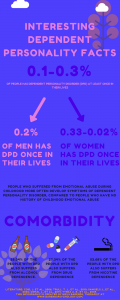What is dependent personality disorder?

Interesting dependent personality disorder facts
We are all dependent on someone for most of our lives, some people more than others. We all need guidance, support, and approval, especially during stressful times. However, dependency becomes problematic when it causes distress and/or functional impairment. Dependent personality disorder (DPD or dependent PD) is characterized by a longtime psychological dependence on others to meet own emotional and physical needs.
People with dependent personality disorder can behave in an extremely clingy and submissive way, because they have a strong need to be taken care of [1]. Also, there is a lack of self-confidence, self-doubting, great discomfort in being alone, and approval seeking in people with DPD [2].
Jump to:
- DPD causes.
- How is dependent PD diagnosed and what are the symptoms?
- What are DPD treatment options?
- The dependent PD test.
- How to cope with DPD?
- Living with someone who has DPD.
- Online counseling for Dependent PD.
- Take me to the homepage.
At Barends Psychology Practice we offer (online) therapy for dependent personality disorder. Contact us to schedule a first, free of charge, online session. (Depending on your health insurance, treatment may be reimbursed).
What are the symptoms of dependent personality disorder?
Not everybody who is dependent on others has dependent personality disorder. As mentioned above, people with dependent PD need to be psychologically dependent for a long time to meet their own emotional and physical needs. But what is a long time? And which needs are we talking about? And are there other symptoms characteristic for DPD?
There are more symptoms that characterize DPD, but not all of them have to be present in order to meet the criteria of dependent personality disorder. Here is a list of common symptoms:
Relationships:
- Being preoccupied with fears of abandonment.
- Feeling helpless and uncomfortable when alone, because of lack of self-confidence in taking care of themselves.
- Immediately looking for a new relationship for care and support when a close relationship ends.
- Expressing disagreement with others is very difficult, because of a fear of losing support or approval.
- Tolerating emotional, verbal, physical or sexual abuse from others, as long as they also get support and nurturance from that person.
- Easily being hurt by criticism or disapproval.
(Advertisement. For more information, please scroll down.)
Responsibility:
- Having difficulty making everyday decisions on their own, without advice or reassurance of others around them.
- Experiencing difficulty initiating or starting projects/tasks, but not because of a lack of motivation or energy.
- Avoiding taking responsibility for tasks, projects, and decisions.
- Needs to have the feeling that someone else takes responsibility for most major areas of their lives.
- Being extremely passive.
As you can see, the symptoms have been divided into two main groups. The first group of symptoms mainly concerns relationships, whereas the latter group mainly concerns avoiding being responsible. According to the DSM V the symptoms aren’t divided into two groups, but this makes it easier for people to read and understand.
When to see a professional?
If you recognize most of the above mentioned symptoms in yourself and they cause you great distress and discomfort, then I recommend you to reach out to a professional. A therapist/counselor can help you with a proper diagnosis and can help you understand what it means to have dependent personality disorder. Also, a therapist can help you reduce the severity of the symptoms and give you tools to deal with stressful events.
(Advertisement. For more information, please scroll down.)
Make sure you find a therapist who is specialized in treating people with personality disorders, because they are much more effective in treating personality disorder, compared to ‘therapists-as-usual’. Be sure to ask how your treatment plan will look like.
Literature used for this page
- [1] Faith, C., 2009. Dependent Personality Disorder: A Review of Etiology and Treatment. Graduate Journal of Counseling, 1, article 7, 1-10.
- [2] Sperry, L. (2003). Handbook of diagnosis and treatment of DSM‐IV‐TR personality disorders (2nd ed.). New York: Brunner‐Routledge.
